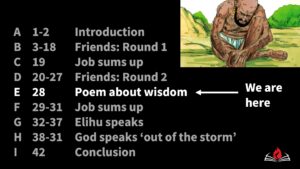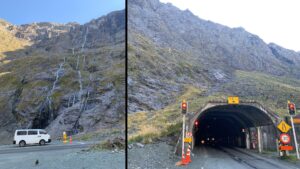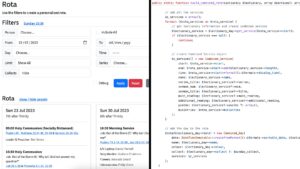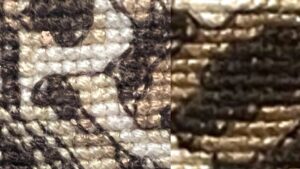A change of pace
If you’ve been reading Job alongside the preaching series – and if you haven’t, please can I encourage you to do that during August, it’s well worth it – you’ll find chapter 28 to be quite different.

Here’s an outline of the book. It is full of speeches: in rounds 1 and 2 of Job’s argument with his friends they speak not to but at each other most of the time. Job’s speeches sum up in chapter 19 and again in 29 to 31. Elihu speaks next, before God speaks to Job out of the storm (38.1 – hence the name of the series).
But in the middle we have today’s chapter, 28. It’s unclear if it’s spoken by Job, or added by the book’s writer – it doesn’t really matter – the point is it’s different. It is not addressed to any of the characters, it is less passionate, more reflective, quiet: Christopher Ash calls it a tranquil, contemplative pause for thought.[1]
A costly search (1-11)
I wonder what the most valuable thing in your life is – and I do mean thing, possession, item. The thing you’d run back into your burning house for, the thing that’s most precious.
For me, one of the most precious objects in our house is this Bible – and before you groan, it’s not because it’s a Bible. I am fairly sure that if our house burned down with all my Bibles inside, I would be able to buy a new one.
This was given to me on the day of my baptism, when I was two months old. What makes it so special is my Dad wrote on the inside ‘Welcome to the family!’ – and he wrote in it again when I decided for myself to follow Jesus ten years later.
I used it as my Bible for many years, until it started to fall apart. You can see the box is held together with sticky tape. So I reluctantly bought myself a new Bible and put this one somewhere safe. It’s one of the few things in our house that is actually irreplaceable.
This poem is about the most valuable thing in the world; it begins with a parable about mining for jewels and precious metals.
Mining is probably one of the most dangerous activities that we humans undertake. There is the constant risk of collapse, down in the dark you are very far from help, and it involves long, hard labour. Verses 3 and 4 paint a picture:
People search out the farthest recesses
Job 28.3-4 (NIV)
for ore in the blackest darkness.
Far from human dwellings they cut a shaft,
in places untouched by human feet;
far from other people they dangle and sway.
The poem describes things that are hard to find, because they are far away, deep down, hidden in darkness. If you’ve ever been to a mine or a cave deep underground you’ll know there is literally no light; your eyes don’t adjust to the blackness because light can’t penetrate that far underground. Mines are isolated, deep and dark – and also hot: the earth is transformed below as by fire (5). It really is dangerous down there, and the work is hard:
People assault the flinty rock with their hands
Job 28.9 (NIV)
and lay bare the roots of the mountains.

On the South Island of New Zealand the Homer Tunnel is three-quarters of a mile long. It took 18 years to complete because it was dug, by hand, through solid granite. The guide book says, ‘progress was slow’. I’ll say!
These days it’s much easier – do you remember those huge machines they used to tunnel under the channel?
The first part of this poem is in praise of human technology, human effort, human dedication to a seemingly impossible task. Only humans do such an insane thing as tunnelling through solid rock – birds and beasts don’t do it (7-8).
Why do we do such a crazy thing? For the precious and useful things we find down there: silver and gold (1), iron and copper (2), lapis lazuli and gold (again, 6) – treasures (10) like onyx (16 – I promise it’s up there!), jasper, rubies (18), topaz (19).
These valuable things are hard to find; in verse 5 the poem compares mining to agriculture – which isn’t easy, but compared to mining it’s a doddle! These valuable things are deep and hidden, but with a lot of effort they can be found. And the search is worth it because of the value people place on the precious things that can only be found deep, deep down in the rock.
Beyond compare and beyond reach (12-22)
But what if the thing we’re searching for isn’t there? Before you all go home and start digging holes in the garden or by the side of the road, there’s no gold or rubies under Birmingham so you might as well save yourself the bother.
A few weeks ago I spent ages trying to find my church keys round the house. I usually keep them clipped to my bag, but they weren’t there. I searched high and low and they were nowhere to be found – because they weren’t at home, they were here, having fallen out of my pocket earlier that day.
All that effort searching was wasted, because my keys couldn’t be found – they simply weren’t there!
That’s where the poem goes next. Better than gold is wisdom:
But where can wisdom be found?
Job 28.12 (NIV)
Where does understanding dwell?
The poet says: look how amazing we humans are. We can dig deep down into the depths of the earth, searching for and finding all sorts of precious and useful things. We are so much cleverer than the dumb birds and beasts who don’t do anything like that!
And we are – but there are some things that cannot be found, no matter how hard we look or how much technology we invent.
Wisdom cannot be found in the land of the living.
Job 28.13-14, 21-22 (NIV)
The deep says, ‘It is not in me’;
the sea says, ‘It is not with me.’ …
It is hidden from the eyes of every living thing…
[Even] Destruction and Death say,
‘Only a rumour of it has reached our ears.’
So what is ‘Wisdom’, this precious thing that cannot be found in the land of the living, that even Death’s heard only a rumour of?

Some of you may recognise this – it’s a page from the app I’ve written that adds readings and other things to the Church Suite rota. And here’s a picture of some of the source code that generates that page. If you want to know how the app works, you need the source code, all 5,000 lines of it.
Here’s a famous bit from The Matrix. The main character – Neo – is suddenly able to decode the Matrix, to see not only what it looks like, but how it works. He unlocks the secret, he understands, which enables him to do amazing things.
Wisdom – capital W – is like the source code of the universe. Wisdom is the understanding of how the world works, not only physically but morally and spiritually as well. Christopher Ash calls it the fundamental underlying order according to which the universe is constructed.[2]
But Wisdom is also more than the source code for the universe – it doesn’t only explain how things fit together, but why. Now we start to understand the point and purpose of this poem in Job. Like so many of us he longs to know why. He sees a world that seems so beautifully ordered and consistent, yet so chaotic and cruel at the same time. He doesn’t understand. What he longs for is Wisdom – with a capital W – so he know why.
No wonder the poem says such Wisdom is beyond compare. It cannot be bought with the finest gold, you cannot weigh out enough silver to buy it (15). Precious stones, gold, crystal, jewels, rubies – they cannot buy Wisdom either; nor can they compare with it (16-18),.
Our best technology, our most persistent and dedicated search cannot find Wisdom; the most precious things we can find cannot buy Wisdom. Wisdom contains the answer to all our questions, it is priceless, utterly beyond compare… and totally beyond reach.
Job wants to read the source code for the universe so he can understand why he is suffering like he is, and he’s right to want that – of course he is. He is driven by his pain, his desperation for answers; no one longs for understanding more than a suffering believer. But the search is doomed: Job must seek, and yet he will never find wisdom.[3] We can’t find it and we can’t buy it, yet we still try because we are desperate to know why.
God knows (23-28)

Many of you will know that Jess likes to bake. When she’s at home and not studying, she’s probably baking. Often I will wander into the kitchen and find her creating something, with flour and icing and mixers and trays and piping bags all over the place. Sometimes I can work out what she’s baking for, but usually I have to ask. ‘Why are you baking today?’ I’ll ask – though what I really mean is, ‘Will I get any?’
With the right equipment I might be able work out what Jess had mixed together to make a cake – flour, eggs, sugar, butter. I might be able work out how much of each ingredient was in there, how high and how long it had been baked for.
But without her, I couldn’t tell you why she had baked it.
The poem reaches a crescendo:
Where then does wisdom come from?
Job 28.20-22 (NIV)
Where does understanding dwell?
It is hidden from the eyes of every living thing,
concealed even from the birds in the sky.
Destruction and Death say,
‘Only a rumour of it has reached our ears.’
It’s impossible! We might as well give up our search now. But the poem doesn’t end there; we’re searching for the wrong thing:
God understands the way to [wisdom]
Job 28.23-24 (NIV)
and he alone knows where it dwells,
for he views the ends of the earth
and sees everything under the heavens.
The book of Job doesn’t give an answer; it gives us God. He knows and understands. He sees all things, from the beginning to the end – not only the big things like Jesus’ birth and the final judgement, but all that you are going through, out there point outside and in here tap heart. He sees it all, and he knows.
God knows. He alone knows and understands why.

We are given the merest of glimpses – this is a glimpse of one of my most precious things, hanging in my study. From that tiny part of the picture it’s impossible to tell why the picture was made – or even what it is! But God sees it all, the whole picture – and he invites us all to trust him.
Verse 28 – are you listening to what God says to us all?:
And God said to the human race,
Job 28.28 (NIV)
‘The fear of the Lord – that is wisdom,
and to shun evil is understanding.’
We’ve seen these words before: it is how Job is described (by God) in chapters 1 and 2 (1.1, 1.8, 2.3). But this verse is crucial to the whole book, for in it God speaks not only to Job but to all of us; as he speaks he directs our attention away from our agonised questions and towards himself.[4]
Although we cannot know Wisdom with a capital W, we can be wise – which means fearing God: not being afraid of him, but having a healthy amount of awe and wonder before the living and Almighty God. It means listening humbly to all he says to us.
Although we cannot understand the inner workings of the world or why things are as they are, we can understand and trust that God’s way is best: turning away from evil and living life the way the author of life calls us to, living his way not ‘doing it my way’.
But there is more. Paul wrote:
My goal is that… [you] may know the mystery of God, namely, Christ, in whom are hidden all the treasures of wisdom and knowledge.
Colossians 2.2-3 (NIV)
Mining for gold will find something that is precious. But if you want something priceless, you need Jesus.
Crying out for answers to the suffering you face is natural and normal. But if you want true peace, you need Jesus not answers.
You can mask the pain with self-help techniques or distraction, by indulging your desires or always getting more. But if you want to find true life, you need to deny yourself and follow Jesus.
God alone knows where wisdom dwells (23). When we ask him to tell us, he responds by giving us Jesus, and inviting us to trust him. That’s easy to say, but oh-so-hard to do.
In the middle of the storm, can we trust the one who calmed the wind and waves with a word?
In the middle of raging doubt and searing pain, can we trust the one who said, ‘Do not be afraid; only believe’?
In the middle of this life, with all its confusion and mess, can we trust the one who said, ‘I am the way, and the truth, and the life’?
The book of Job does answer our questions: not as we might want but as we need. God alone knows where wisdom dwells (23). God alone knows, which means it is not for us to know, however much we might want to. Instead God gives us his one and only Son Jesus Christ, in whom are hidden all the treasures of wisdom and knowledge (Colossians 2.23). And if we seek him, we will find him – or rather, he finds us.
So the answer God gives to all our questions is Jesus – the way, the truth and the life – and he invites us to trust him.
The question: will we?
[1] Christopher Ash, Out of the Storm, 65.
[2] Ash, Storm, 67.
[3] Ash, Storm, 70.
[4] Ash, Storm, 72.